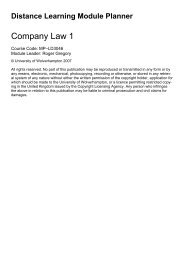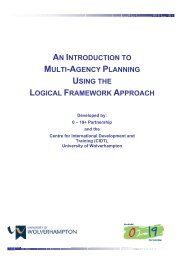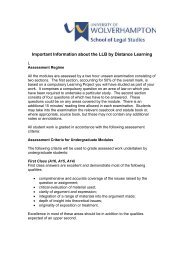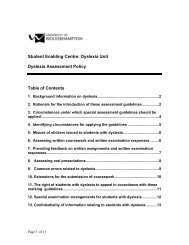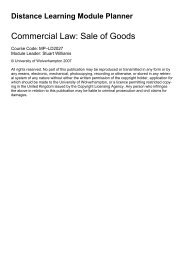This activity can be found in Pretty et al, (1995) - University of ...
This activity can be found in Pretty et al, (1995) - University of ...
This activity can be found in Pretty et al, (1995) - University of ...
- No tags were found...
You also want an ePaper? Increase the reach of your titles
YUMPU automatically turns print PDFs into web optimized ePapers that Google loves.
HO 07 FS5.1Types <strong>of</strong> QuestionsOpen-ended QuestionsAn open-ended question is one that <strong>can</strong>not <strong>be</strong> answered with a s<strong>in</strong>gle word or phrase such as‘yes’ or ‘no’. They <strong>can</strong> <strong>be</strong> quite powerful <strong>be</strong>cause they stimulate th<strong>in</strong>k<strong>in</strong>g, encourage greaterdiscussion, and discourage participants from tak<strong>in</strong>g def<strong>in</strong>itive positions on issues not y<strong>et</strong>thoroughly discussed. They typic<strong>al</strong>ly <strong>be</strong>g<strong>in</strong> with words such as ‘how’, ‘what’ or ‘why’.Examples: What happens if we don’t solve the problem?How do the rest <strong>of</strong> you feel about this?Greater Response QuestionsIn order to ga<strong>in</strong> understand<strong>in</strong>g and add depth to participants’ <strong>in</strong>volvement, facilitators need toknow how to draw out greater <strong>in</strong>formation, us<strong>in</strong>g words such as ‘descri<strong>be</strong>’, ‘expla<strong>in</strong>’ and‘tell’.Example: Can you descri<strong>be</strong> the process <strong>in</strong> more d<strong>et</strong>ail?Ch<strong>al</strong>leng<strong>in</strong>g QuestionsUsed to ch<strong>al</strong>lenge certa<strong>in</strong> types <strong>of</strong> statement. These are statements that are <strong>al</strong>l-embrac<strong>in</strong>g,<strong>al</strong>low for no exceptions, and <strong>of</strong>ten <strong>in</strong>clude words such as ‘never’, ‘<strong>al</strong>ways’, ‘everyone’, ‘<strong>al</strong>l’. It isimportant to ch<strong>al</strong>lenge such statements s<strong>in</strong>ce the discussion and learn<strong>in</strong>g processes <strong>can</strong> <strong>be</strong>stopped by them.Example: Statement - I have never had any problems with clients.Question – Never?Ch<strong>al</strong>leng<strong>in</strong>g questions are <strong>al</strong>so used with other gener<strong>al</strong>ised statements that s<strong>et</strong> limitations onourselves or others, <strong>of</strong>ten <strong>in</strong>volv<strong>in</strong>g words like ‘must’, ‘should’ or ‘<strong>can</strong>’t’.Examples: Statement – I must compl<strong>et</strong>e the work by the end <strong>of</strong> the month.Question – What would happen if you didn’t?Statement – I <strong>can</strong>’t make presentations.Question – What is stopp<strong>in</strong>g you?Redirection QuestionsA participant will <strong>of</strong>ten ask questions <strong>of</strong> the facilitator as a follow-up to a remark made by themor by another participant. If the question is related to ‘content’ the facilitator may wish to re-directit to other participants.Example: How would the rest <strong>of</strong> you respond to that question?Feedback and Clarification QuestionsAt certa<strong>in</strong> times <strong>in</strong> me<strong>et</strong><strong>in</strong>gs/workshops, the facilitator needs to br<strong>in</strong>g closure or clarification to atopic <strong>be</strong><strong>in</strong>g discussed; it is <strong>al</strong>so important that <strong>al</strong>l participants understand the issue.Examples: Where are we; will someone summarise our position?L<strong>et</strong>’s see if I heard you right; you are say<strong>in</strong>g……?Closed QuestionsThe closed question is <strong>of</strong>ten asked too frequently by <strong>in</strong>experienced facilitators. These questionstypic<strong>al</strong>ly result <strong>in</strong> a ‘yes’, ‘no’ or short response from participants and provide little<strong>in</strong>volvement. Use <strong>in</strong>frequently and for clarification s<strong>in</strong>ce they add little to the discussion process.Example: Has this issue <strong>be</strong>en expla<strong>in</strong>ed clearly?87 Jamaica All Age Schools Project: Facilitator Tra<strong>in</strong><strong>in</strong>g for School Based Resource Teachers







